[2023 macOS Catalina Download Guide] How to Download and Install macOS 10.15
What Is a macOS Catalina DMG/ISO File
macOS Catalina introduces a new method of updating the operating system, using macOS Catalina Installer files which come in two formats: ISO and DMG.
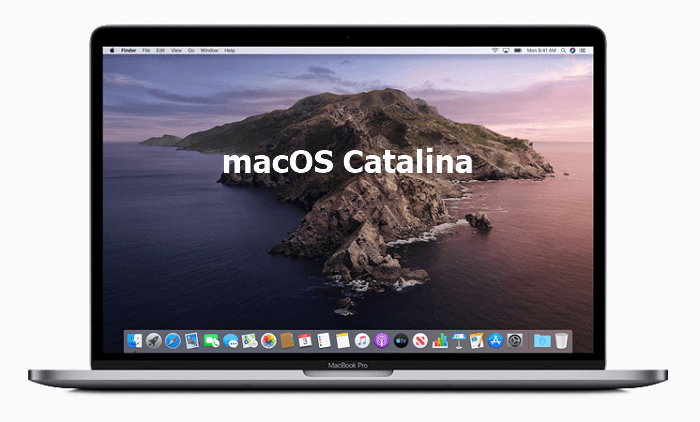
macOS Catalina ISO files Virtual machines are designed to run multiple operating systems on a single physical computer, allowing you to run macOS on a non-macOS device. This is made possible through software like VMware Fusion and Parallels Desktop, which create a virtual environment that can run macOS without affecting the host machine's operating system. This means you can have a virtual machine with a macOS installation, while the physical machine remains running its original operating system, such as Windows or Linux.
macOS Catalina DMG files The provided files are intended for use with physical machines, such as Mac mini and Mac Pro, and can be used to create a bootable macOS Catalina installer drive.
macOS 10.15 Catalina New Features
macOS Catalina 10.15 provides essential security updates and bug fixes for your Mac, with new features such as improved security, a redesigned Music and TV app, and a new Home app to control your smart home devices.
Mac Wi-Fi: The issue was resolved by running the command "defaults write com.apple.
iCloud Drive: Fix bugs that could prevent files from syncing to iCloud.
Mac Catalyst: Apple is releasing a new class of Mac apps built from popular iPad titles, allowing users to access their favorite iPad apps on their Mac computers. This move is expected to bring a fresh wave of creativity and innovation to the Mac ecosystem, as developers can now leverage the power of the iPad's touchscreen interface and intuitive design principles to create Mac apps that are both visually appealing and highly functional.
Find My: Apple has merged the Find My Mac and Find My Friends features into a single app called "Find My". This app allows users to locate their Apple devices, such as iPhones, iPads, and Macs, as well as share their location with friends and family.
Apple Mail: In Apple Mail, you can mute a thread to stop receiving notifications, block a sender to prevent them from sending you emails, and unsubscribe from a newsletter or mailing list to stop receiving emails from that specific sender.
Time Machine: What specific changes have been made to the way data is backed up to network-attached devices? I'd be happy to help you summarize the information in one paragraph.
Changed Components: macOS Catalina only supports 64-bit apps, is incompatible with 32-bit apps, and has removed all 32-bit-only apps from the Mac App Store.
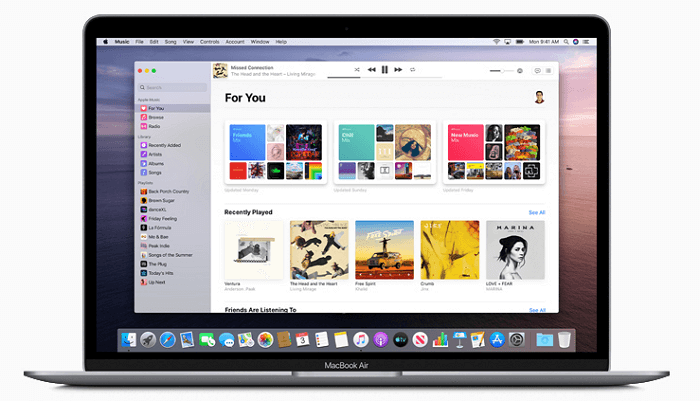
macOS 10.15 Catalina System Requirements
Before downloading and installing macOS Catalina, check the system requirements to ensure that your device can install this OS.
- iMac (Late 2012 or later)
- iMac Pro
- MacBook (Early 2015 or later)
- MacBook Air (Mid 2012 or later)
- MacBook Pro (Mid 2012 or later)
- Mac Mini (Late 2012 or later)
- Mac Pro (Late 2013 or later)
macOS Catalina Download - How to Download macOS 10.15 Catalina
Apple's operating system, macOS 10.15 Catalina, is now available for download, and can be installed by going to the App Store, clicking "Update" next to "macOS Catalina" in the sidebar, and following the prompts to download and install the update.
Step 1. Make sure your Mac supports macOS 10.15 Catalina.
Step 2. To ensure your Mac's data is safe, back up your device using Time Machine or another reliable backup method. This will protect your files, photos, and other important information in case your Mac experiences a hardware failure, is stolen, or is damaged by a software issue.
Step 3. To install macOS 10.15 Catalina, download the installer from the Mac App Store.
- Open the Downloads page from Apple's website.
- Select "macOS" and search for "macOS Catalina".
- Click "Download" to get macOS Catalina.
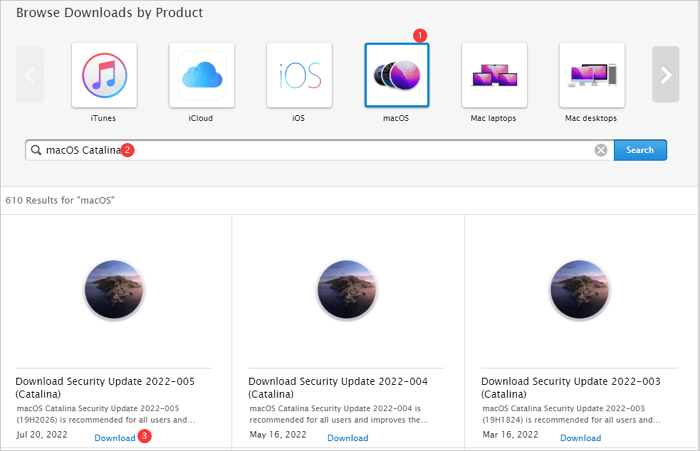
If you want to get the macOS Catalina DMG files or install Catalina ISO on VirtualBox, you can watch the video below to get the macOS Catalina ISO download directly.
- 0:28 Required files
- 1:23 Download VirtualBox
- 2:22 Install VirtualBox
- 4:39 macOS Catalina ISO Download...
How to Install macOS 10.15 Catalina
Double-click the installer file to begin the installation process when the download is completed. Here is the process to clean install macOS Catalina.
Step 1. Create a Bootable Installer with Terminal
- Connect a 16GB USB to your Mac
- Open Terminal and input the command:
To create a bootable macOS installer on a USB drive, you can use the command `sudo/Applications/Install macOS Catalina.app/Contents/Resources/createinstallmedia --volume /Volumes/X` in the Terminal, replacing "X" with the name of your USB drive. This command will guide you through the process of creating a bootable installer on your USB drive.
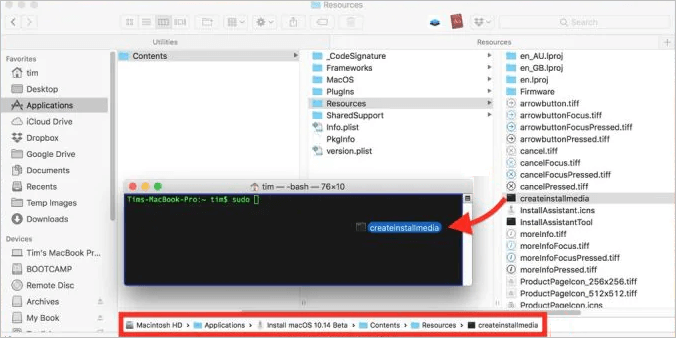
Step 2. Clean Install macOS Catalina 10.15
- To restart your Mac and enter Recovery Mode, simply restart your Mac and immediately press and hold the Command + R keys on your keyboard. This will boot your Mac into Recovery Mode, allowing you to access various utilities and options for troubleshooting and repairing your Mac.
- To access Disk Utility in Recovery Mode, navigate to the Utilities menu and select Disk Utility. This will launch the application, allowing you to perform various disk-related tasks such as erasing, formatting, or repairing disks.
- Open Disk Utility and select your Macintosh HD from the sidebar. Click on the "Erase" button.
- When the system restarts in recovery mode, choose "reinstall macOS" to reinstall the operating system.
- Then, install macOS Catalina with the onscreen instructions.
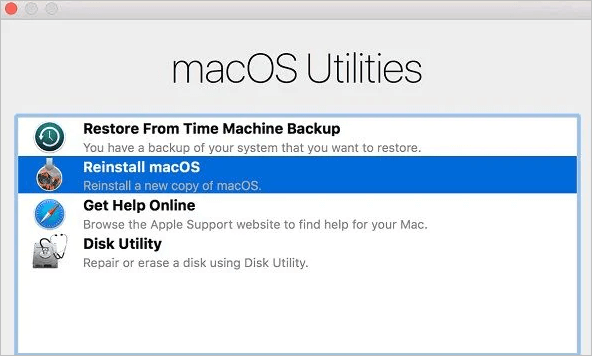
Bonus Tip: How to Recover Data After System Reinstall/Update
When reinstalling your system, you'll lose all data on your computer, including created files and installed applications. Fortunately, there are ways to recover this data.
To recover deleted files on a Mac, consider using Time Machine backup, iCloud, or a third-party recovery tool like Deep Data Recovery.
- It's a powerful data recovery software that can help you recover lost or deleted files from your Mac, making it a valuable tool for anyone who's accidentally deleted something important.
- The software provides an easy and efficient way to recover data, making it a valuable tool for users.
- With Deep Data Recovery for Mac, you can recover deleted files from macOS Ventura/Big Sur/Catalina/Mojave.
- The software supports various file formats, making it compatible with most data types.
Download this Mac data recovery software and restore data from any Mac device.
Conclusion
Downloading and installing macOS Catalina is a relatively straightforward process. Simply head to the App Store, download the installer, and follow the prompts to begin the installation process. Be sure to read any instructions carefully and follow all steps to avoid any issues, and you'll be enjoying the new features and improvements of macOS Catalina in no time.
If you're experiencing data loss and your Mac won't boot into Recovery Mode, you can seek assistance from Qiling for help.
macOS Catalina Download FAQs
To get further help, read the following questions and answers. They can give you additional help.
1. How to download and install macOS 13 Ventura?
To download and install macOS 13 Ventura
- Start the App Store and type in macOS Ventura
- Click Get to download.
- Click Download to confirm.
2. How to fix Mac that won't start after the update?
Mac won't restart after update. Here are the solutions:
- Force to Restart Mac
- Reset the NVRAM
- Boot your Mac in Safe Mode
- Enter Recovery Mode
3. How to download macOS Big Sur?
- Open the App Store page for macOS Big Sur.
- To download the macOS installer, click the "Get" button in the App Store.
- After downloading the installer, it will automatically open. Simply follow the onscreen instructions to install macOS Big Sur.
4. Can you upgrade from older versions of OS X to Catalina?
Here are the steps to upgrade to macOS Catalina in one paragraph:
- Open the System Preferences menu and select Software Update.
- To begin downloading the Catalina installer, click the "Upgrade Now" or "Download" button.
Related Articles
- Fixed: SFC (SFC / SCANNOW) Is Not Working on Windows
- [2023 Tips] Update Not Found - The Requested Version of macOS Is Not Available
- SD Card Keeps Disconnecting or Disappearing
- Fix USB Flash Drive Not Working on Windows 10/7